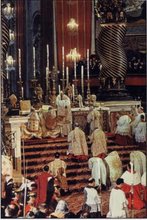Prospects for a Catholic Monarchy
in the Modern World
As regular readers (or even the occasional reader) of my blog know, I am a traditional Catholic monarchist, and support the restoration of traditional monarchies in Europe or the establishment of entirely new monarchies where none have existed or it is impractical to restore a defunct monarchy. But what are the prospects for a monarchy in the modern world, in particular a Catholic monarchy? I have asked myself this question many times, and although it is not an impossible task, it is a daunting one.
One reason for the daunting nature of this task is modern conceptions of human rights. How the modern world now defines human rights in many ways is in direct contradiction to what many of us monarchists would like to see.
Point one: the modern definition of democracy as a human right. The Office of the United Nations High Commissioner for Human Rights' website has this to say about democracy: "
The Universal Declaration of Human Rights, adopted by the General Assembly in 1948, elaborated on this original commitment to democracy by proclaiming that 'the will of the people shall be the basis of the authority of government' and guaranteeing to everyone the rights that are essential for effective political participation. The International Covenant on Civil and Political Rights, adopted by the Assembly in 1966, conferred binding legal status on the right of individuals to participate in the processes that constitute the conduct of public affairs, and further strengthened the protection accorded to participatory rights and freedoms" (quote found
here). Many Catholic monarchists (although by no means all) subscribe to the Catholic version of absolutist monarchy, whereby the monarchy has near absolute governmental powers. How can such a monarchy be established in the face of such world-wide approval of popular participation in government? My personal view is that when a government gives the people the right to participate in government, such a government naturally evolves into immorality; when the people get to define what is lawful and what is not, the natural sinful nature of man tends to kick in and what is immoral is eventually defined as a right (i.e. pornography, homosexual marriage, abortion, etc.). When a Catholic monarch (guided by the Church) has near absolute governmental powers he determines what is lawful and what is not, regardless of the "will of the people." The king is the father of his people, and he must do what is right for his children even if they don't like it. With democracy ingrained upon the minds of the world's population as a human right, to form a system of government which is the direct antithesis of democracy is most assuredly an uphill struggle.
Point two: the modern definition of "reproductive rights of women" as a human right. On the website of the Division for the Advancement of Women of the United Nations Department of Economic and Social Affairs, I found the following declarations from the Forth World Conference on Women (Beijing, China - 1995): "
17. The explicit recognition and reaffirmation of the right of all women to control all aspects of their health, in particular their own fertility, is basic to their empowerment;" and "
30. Ensure equal access to and equal treatment of women and men in education and health care and enhance women's sexual and reproductive health as well as education;" (full declaration found
here). If women have the human right to control all aspects of their fertility, they have the right to use contraception and the right to have an abortion. One of the functions of a Catholic monarchy is to uphold the Church's teachings within secular law; the Church defines what is moral and immoral and the king upholds this in the secular sphere (to a point; I do not believe, for example, that fornication should be illegal, but fully believe it to be a mortal sin). It follows that a Catholic monarch must uphold the Church's teachings on the dignity of human life and make all forms of abortion and contraception illegal within his realm. Just like democracy, with contraception and abortion ingrained into the minds of the world's population as a human right, the formation of a Catholic monarchy where such murderous practices are illegal would face international opposition.
In conclusion, the formation of a Catholic monarchy--either the restoration of a defunct monarchy or the establishment of a new one--within the modern world is a daunting task. I must point out that while a difficult task, it is not an impossible one. "With men this is impossible: but with God all things are possible" (St. Matthew, 19:26).







